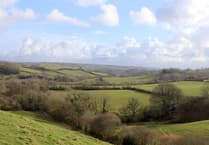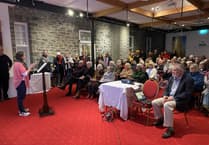Fossil expert Professor Malcolm Hart will be speaking on ‘Fossils of the Jurassic Coast World Heritage Site’ next month. The talk takes place at the Tavistock Guildhall on Thursday, May 5 at 7pm.
Professor Malcolm Hart PhD DSc FGS CGeol CSci is Emeritus Professor in Micropalaeontology at the University of Plymouth, having ‘retired’ in 2010.
Since 1965, he has been undertaking research on foraminifera and other groups of microfossils. Best known for his published work on the foraminiferal biostratigraphy of the Cretaceous, he has recently been involved in a study of Jurassic coleoid fossils and the statoliths and arm hooks found in many Jurassic sediments.
The Cretaceous work involved the site investigation and construction of the Channel Tunnel and Thames Barrier – both of which used foraminiferal biostratigraphy quite extensively.
At the University Plymouth he was head of Department of Geological Sciences for 10 years before becoming pro vice-chancellor (research and innovation) of the university for eight years and associate dean of science (research) for a further six.
In 2000, Malcolm was involved in the submission to UNESCO of the application for World Heritage Site inscription of the Jurassic Coast. This was successful and he was one of the team that welcomed HRH Prince Charles to the opening celebration.
In 2006 he also advised the Danish Government on the submission of Stevns Klint to UNESCO for World Heritage Site status.
In recent years he has been awarded the Brady Medal by The Micropalaeontological Society, the Lamarck Medal by the European Geosciences Union (EGU) and the Gryzbowski Award by the Gryzbowski Foundation (Krakow, Poland).
When the Dorset and East Devon Coast World Heritage Site was inscribed on the UNESCO (Natural) list in 2000, one of the items of ‘Outstanding Universal Value’ was the history of life enclosed in the rock succession.
In the 185 million years of Earth history recorded in the cliffs of East Devon and Dorset, there is an outstanding series of fossil assemblages that piece together the geological history of the area.
Palaeontologists and geologists have, in over 200 years of research, reconstructed the animals and the history of life on Earth that they record. There are lessons for the modern world in terms of climate change, ocean acidification and mass extinction events. As James Hutton famously said, ‘the present is the key to the past’ whereas we now suggest that, perhaps, the ‘past is the key to the future’.




